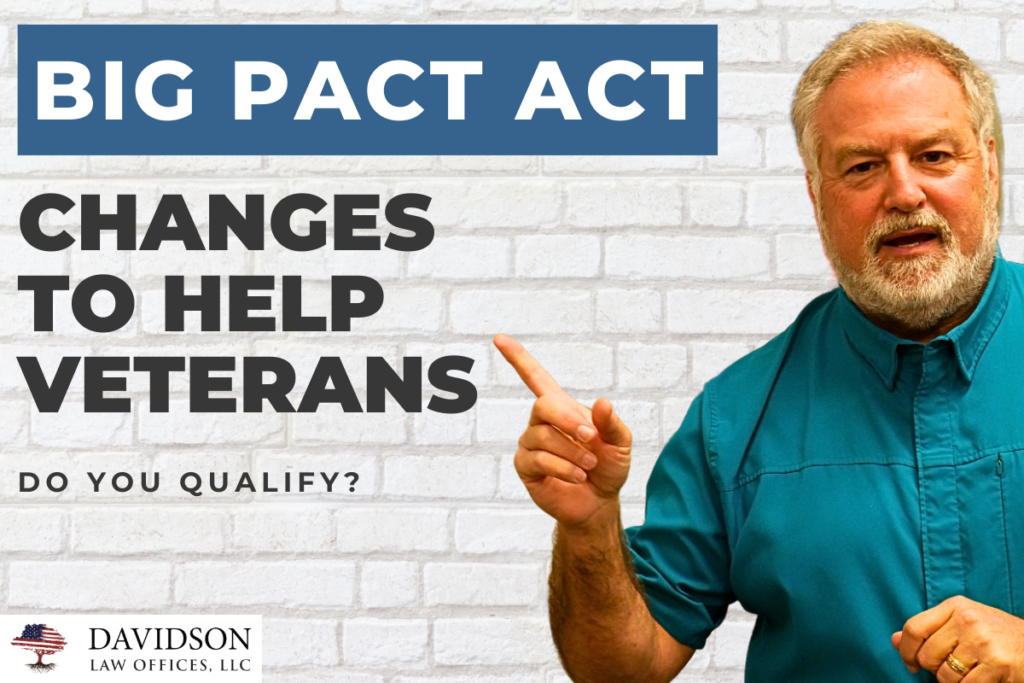Now, while the PACT Act was a huge step forward, there have been some significant updates recently that expand and improve upon what was initially laid out. So today, I’ll break down these key updates and tell you what you need to know about them.
Expanding Eligibility for VA Healthcare
One of the most important updates is the expansion of eligibility for VA healthcare. If you served in the Vietnam War, Gulf War, or in post-9/11 conflict areas and were exposed to toxic substances, you may now be eligible for VA healthcare. Here’s the best part: you don’t need to apply for disability compensation before you can access healthcare. Previously, veterans often had to go through a long, complicated process to apply for disability benefits before they could access healthcare services. Now, all you need to do is apply for healthcare, and if you’re eligible, you’ll be enrolled.
This expansion includes more than 20 presumptive conditions linked to toxic exposures, such as certain cancers and respiratory illnesses. The VA has a comprehensive list of these conditions on their website, so I won’t go into them in detail today, but it’s worth checking out if you think you may be affected.
What Are Presumptive Conditions and How Do They Benefit Veterans?
The concept of “presumptive conditions” is crucial here. Normally, to receive benefits for a condition, veterans would need to prove that it’s directly related to their military service. But with presumptive conditions, you don’t have to prove that connection. If you have one of the listed conditions, the VA automatically presumes that it’s related to your exposure to toxic substances, making it easier for you to get the care you deserve.
Additionally, the list of recognized locations where veterans may have been exposed to toxic substances has been expanded. So, if you served in Vietnam, for example, you’re likely familiar with the exposures to Agent Orange. But now, even veterans who served in other countries, like Thailand, or in certain timeframes, might be eligible. If you’re unsure whether your location or service time qualifies, I recommend checking the VA website or reaching out for clarification.
Mandatory Toxic Exposure Screenings
Another key update under the PACT Act is the requirement for mandatory toxic exposure screenings. Once you’re enrolled in VA healthcare, you’ll receive regular screenings to identify any toxic exposure-related conditions early on. This is a big deal because early detection and treatment can make all the difference in managing these long-term health effects.
In addition to screenings, there’s also a strong focus on enhanced research and education related to toxic exposures. The VA is working to provide more resources for veterans to better understand the risks they face and to continue developing improved healthcare options for these conditions.
Phase-Out of Enrollment Dates: A Game Changer for Veterans
Now, here’s a significant update that could benefit many veterans: starting in February 2024, the VA will remove the phase-in enrollment dates under the PACT Act. What this means is that veterans will be able to enroll in VA healthcare sooner than they originally thought, without having to wait for a designated enrollment window.
This is especially beneficial if you’ve been waiting for the VA to open enrollment for veterans exposed to toxic substances. You don’t need to wait for your disability compensation to go through. All you need to do is apply for healthcare, and you’ll be in the system, which means you can start receiving the care you need much quicker.
Radiation-Exposed Veterans and Special Care
Another important group that has been impacted by the PACT Act are radiation-exposed veterans. If you served in activities that involved exposure to radiation – such as those involved in the cleanup of atomic tests or accidents – you may now be eligible for healthcare and benefits under the PACT Act, just like Vietnam-era veterans exposed to Agent Orange.
This update specifically expands the definition of radiation risk activity to include veterans who were involved in cleaning up or decontaminating sites related to radiation exposure. For example, veterans who participated in the cleanup of the B-52 bomber crash in Spain in the 1960s or those involved in testing or decontamination efforts in Japan after WWII could be eligible. If you were in any of these groups, you may be entitled to medical care and services related to those exposures.
Just like Vietnam veterans exposed to Agent Orange, radiation-exposed veterans won’t have to pay co-pays or third-party bills for their medical care, including medications, as long as the conditions are related to their exposure.
What Does This Mean for You?
If you’re a veteran or know a veteran who might have been exposed to toxic substances, it’s crucial to get familiar with the details of the PACT Act. Whether it’s accessing healthcare or applying for benefits related to toxic exposure, this law provides an important safety net for veterans who have long been left behind in terms of healthcare access.
The updates I’ve shared here are just a few of the many changes coming through the PACT Act. With more information becoming available regularly, it’s important to stay in the loop. Make sure you’re getting the healthcare you deserve and don’t miss out on the benefits that might be available to you.
Contact Us for Help!
If you need assistance with filing or appealing VA disability claims, complete this form or give us a call at (229) 226-8183. If you’d like to see this blog in video format, you can watch it below. Please be sure to SUBSCRIBE to our YouTube channel and click the bell notification button so that you’re notified each time we publish a new video.

